-
ICMag with help from Landrace Warden and The Vault is running a NEW contest in November! You can check it here. Prizes are seeds & forum premium access. Come join in!
You are using an out of date browser. It may not display this or other websites correctly.
You should upgrade or use an alternative browser.
You should upgrade or use an alternative browser.
Vintage News Articles & Finds
- Thread starter billycw
- Start date
"This is so well known to every good housewife in the country, that I shall not need to write any description of it"
-Nicholas Culpepper, in The English Physician, 1778


The English Physician, by Nicholas Culpepper - 1778
"being boiled in milk, and taken, helpeth such as have a hot dry cough."
"The decoction of the roots easeth the pains of the gout, the hard homours of knots in the joints, the pain and shrinking of the sinews, and the pains of the hips"
-Nicholas Culpepper, in The English Physician, 1778

Tobacco package labels - lithograph by Hatch Company, 1870's
-Nicholas Culpepper, in The English Physician, 1778


The English Physician, by Nicholas Culpepper - 1778
"being boiled in milk, and taken, helpeth such as have a hot dry cough."
"The decoction of the roots easeth the pains of the gout, the hard homours of knots in the joints, the pain and shrinking of the sinews, and the pains of the hips"
-Nicholas Culpepper, in The English Physician, 1778

Tobacco package labels - lithograph by Hatch Company, 1870's
"Arizona David" with 27 gram bud of "Orange Spice"


California Marijuana Farming

California Marijuana Farming
Hashish For Sale In Kathmandu

Gathering Water In Mazar i Sharif

Gathering Water In Mazar i Sharif
Ganja. St Vincent, Grenadine Islands


Zulu's smoking - South Africa by B W Caney - 1880
The South African: Smoker Games
Long before the Hunger Games would captivate the delight of many a sauced smoker, cannabis smokers in South Africa came up with their own way of higher entertainment...
There can only be one, do you have what it takes to win... The Smoker Games...

"Men in Pondoland playing a ‘Saliva Game’" 1904
Smoking cannabis in South Africa was so fun, they turned it into a game...
In one version of the South African smoker games, 2 people would sit across from each other.
Taking turns hitting the pipe, they would exhale the smoke through a 'tambootie grass straw' (natural reed often used as interchangeable mouth pieces on pipes).
While exhaling the goal was to mix in your spit or saliva forming wet smokey bubbles dampening the ground. Moving along with their hit of smoke, they would draw labyrinthine like patterns.
The next smoker would continue the labyrinthine pattern until a impasse is reached declaring a victor in the Smoker Games...

"Men in Pondoland playing a ‘Saliva Game’" 1904
Like a dirty 70's basement version of 'Risk' with just a bit more spitting involved, The Zulu tribe played a more battle type version of the smoker games.
The game would start the same as the first, with this one being a bit different in the drawing.
Blowing smoke and spit through the straw, the spit bubbles produced in this version represented army's. The ground the battle field...
To win you surround your challenger's army in a circle of spit...
The Swazi and Tsonga groups also played the game very much like the Zulu, described in the 1904 book 'The Essential Kafir' by Dudley Kidd...
"One man fills his lungs with smoke first, and hands the pipe to his friend who fills his lungs. Then they take small hollow reeds and exhale the smoke through these reeds, making bubbles with their saliva. One man blows the smoke out and forms a row of bubbles on the ground, and his friend tries to outflank him by making his row of bubbles encircle the first line. So they go on, each trying to win. The game is something like a form of chess game played in a dirty fashion."
-Dudley Kidd in the 'Essential Kafir' 1904
Both these versions could be played with multiple contenders playing at the same time in a team format. The winners would be declared when there was only one left...

“Zulus Smoking Insango" (playing the smoker games), 1900
Why spit?
While smoking cannabis, salivary glands became increasingly restricted, as the matches went on, the attacks became weaker and weaker.
With a bravado like a drinking game, those who could "handle their high" with saliva left in mouth, would win...
These smoking games were so intertwined with the social gatherings in South Africa that a Zulu Chief would argue the point in testimony to the South African Native Affairs Commission, against the country's purposed criminalization of cannabis...
What is your opinion of this indiscriminate smoking of hemp by the Zulu; would you like to see a law putting that down, as drink is put down?
The old custom was the proper way, whereby the smoking of hemp was restricted to adults and grown-up men…
Would you restrict it to grown-up men?
Yes, because the adult is able to control himself; he takes a whiff of the pipe or the horn, and he passes spittle through a stick onto the floor, and makes figures; and passes on the horn to his next neighbour; but he does not use it to excess. The young people smoke it to excess, and they fight with others, and they become mad through it, and rush away sometimes out of the huts like mad people.
Would you like it restricted to adults?
Yes, those who take a draw, and amuse themselves by making figures on the floor, and then pass the horn on.
-Zulu chief Swaimana, in his testimony to the South African Native Affairs Commission - 1905
The Smoker Games, there can only be one...

Smoking hemp, Swaziland, South Africa
Green Squall, thanks for the share's. See from the picture's your reading Jerry Biesler's book 'The Bandit of Kabul', I really enjoyed that read. Birth of Cali O might be when Jerry B grew his mexican genetics in Afghanistan crossing them to the local lines...
Wrote a lot about it running Bodhi's cali o lines thread here:
Exploration of the Big O...Bodhi's Ae77 Cali O X's
https://www.icmag.com/ic/showthread.php?t=304028
One tidbit of history from the book, who may be responsible for some of the purest hash oil, 'Montreal Michael'...
post from thread,
Thought I would bring up an off topic character from the book "the Bandit of Kabul" that stuck out to me while we wait for Veg.
Montreal Michael -
He gets the appreciation clap, how you doin wave and respect brother point from me

A crazy Canadian the author meets in Goa 1971, already obsessed with pushing the envelope and making hash oil from hash to get by customs easier. He then meets up with him in Islamabad in '72 where he took 6 months collecting pieces for his hash rig from the scientific supply outlets to bring back to Afghanistan.
In Islamabad they meet 2 other Canadian's trying to make the same type of rig named Cadillac and the Mad Professor. Sittin at a table in '72 an American and 3 Canadian's in Islamabad all trying to make rigs for hash oil, the odds?
I will just post the last part as written in the book.
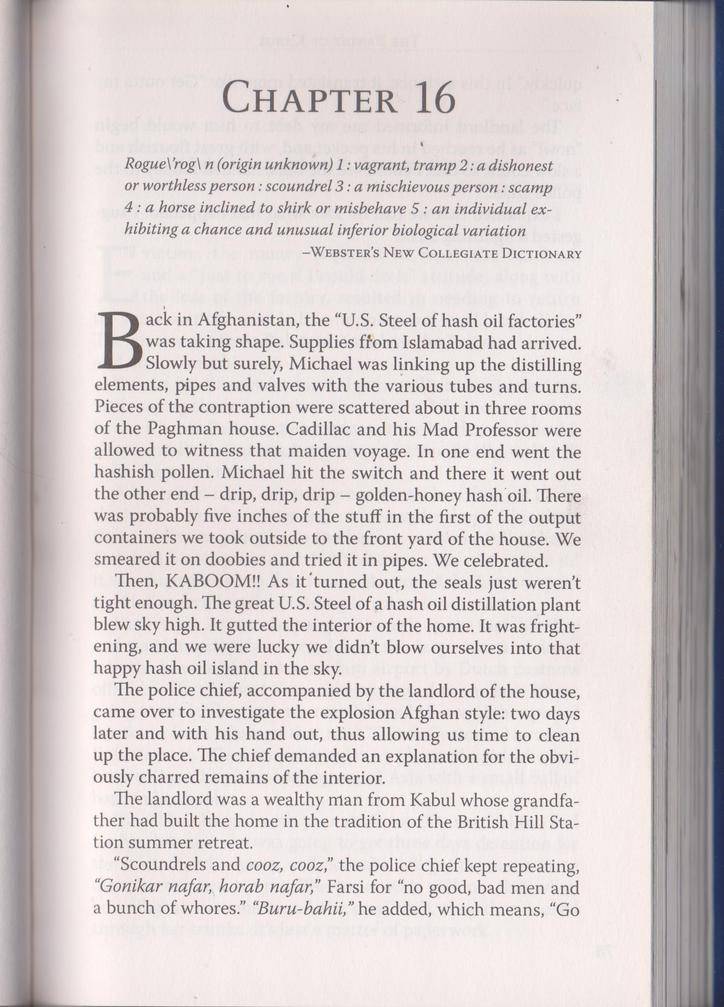
And from the book "Spliffs: A Celebration of Cannabis Culture"
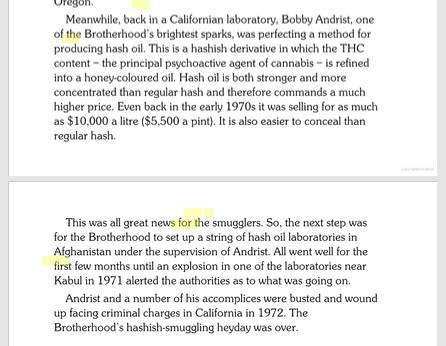
book "Spliffs: A Celebration of Cannabis Culture" by Nick Jones/Marks
It is also briefly talked about in Chapter 18 of the book "The Brotherhood of Eternal Love: From Flower Power to Hippie Mafia: The Story of the LSD Counterculture" by Tendler/May.
The Hash explosion heard round the world
Wrote a lot about it running Bodhi's cali o lines thread here:
Exploration of the Big O...Bodhi's Ae77 Cali O X's
https://www.icmag.com/ic/showthread.php?t=304028
One tidbit of history from the book, who may be responsible for some of the purest hash oil, 'Montreal Michael'...
post from thread,
Thought I would bring up an off topic character from the book "the Bandit of Kabul" that stuck out to me while we wait for Veg.
Montreal Michael -
He gets the appreciation clap, how you doin wave and respect brother point from me

A crazy Canadian the author meets in Goa 1971, already obsessed with pushing the envelope and making hash oil from hash to get by customs easier. He then meets up with him in Islamabad in '72 where he took 6 months collecting pieces for his hash rig from the scientific supply outlets to bring back to Afghanistan.
In Islamabad they meet 2 other Canadian's trying to make the same type of rig named Cadillac and the Mad Professor. Sittin at a table in '72 an American and 3 Canadian's in Islamabad all trying to make rigs for hash oil, the odds?
I will just post the last part as written in the book.
And from the book "Spliffs: A Celebration of Cannabis Culture"
book "Spliffs: A Celebration of Cannabis Culture" by Nick Jones/Marks
It is also briefly talked about in Chapter 18 of the book "The Brotherhood of Eternal Love: From Flower Power to Hippie Mafia: The Story of the LSD Counterculture" by Tendler/May.
The Hash explosion heard round the world

Hi Billy,
I just received the book today and am looking forward to starting it. I was pleasantly surprised to find out it was full of photographs! Thanks for that link and book titles as well. I can't get enough of Cannabis History.
Have you read "The King of Nepal: Life Before the Drug Wars"? I noticed it's on Kindle Unlimited.
I just received the book today and am looking forward to starting it. I was pleasantly surprised to find out it was full of photographs! Thanks for that link and book titles as well. I can't get enough of Cannabis History.
Have you read "The King of Nepal: Life Before the Drug Wars"? I noticed it's on Kindle Unlimited.
I did end up reading 'The King of Nepal' G.S, enjoyed it too. Jerry's writing style and stories talked to me a little more, but some good nuggets to be found. One picture from King of Nepal is Jerry's shirt that he gave out with orders, Pietri puts the date at 73 but the necklace says 78. Same bud as 'Arizona David' is holding in your picture.
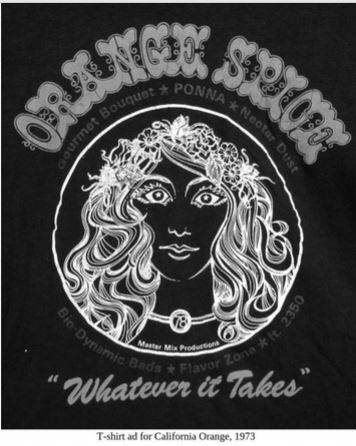
Jerry B. Orange Spice Shirt from the book 'The King of Nepal'
Jerry B. Orange Spice Shirt from the book 'The King of Nepal'
memories
memories
memories
thank you brings back great times , I lived in Laguna during some of the time , still haven't recovered
"I think these hundreds of princely costumes are changed every fifteen minutes during half the night; splendid pageants are filing about the stage constantly, yet one seems never to see the same dress twice. The final grand transformation scene is a vision of magnificence such as no man could imagine unless he had eaten a barrel of hasheesh."
- Mark Twain, in his review in Alta California (March 3, 1868) of the play “The White Fawn”

Mark Twain, 1867
The Intoxicating Twain of Hasheesh
Mark Twain will forever be remembered for his beloved American classics such as 'The Adventures of Tom Sawyer', but what inspired such stories that would tug at the Worlds emotions?
In a 1865 article in the San Francisco Dramatic Chronicle, we get a hint into what inspired one of America's great writers...
Hasheesh...
"It appears that a ‘Hasheesh’ mania has broken out among our Bohemians. Yesterday, Mark Twain and the ‘Mouse-Trap’ man were seen walking up Clay street under the influence of the drug, followed by a ‘star,’ who was evidently laboring under a misapprehension as to what was the matter with them."
-The San Francisco Dramatic Chronicle, Sept. 18, 1865
150 years later and stoners still can't walk down the street without getting hassled by the man...
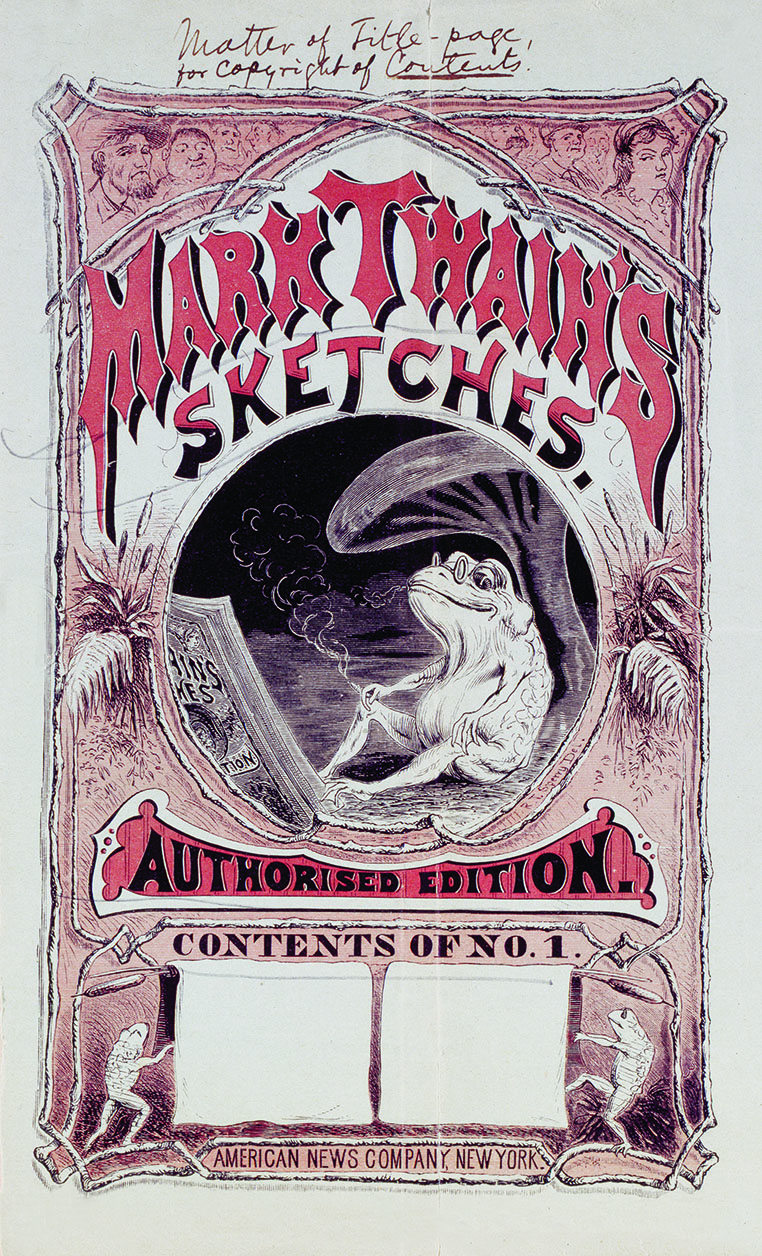
Pamphlet for which Samuel Clemens (Mark Twain) sought a copyright from the Library of Congress. c.1874
"Now, I don't approve of dissipation, and I don't indulge in it either; but I haven't a particle of confidence in a man who has no redeeming petty vices."
- Mark Twain, from the Moral Statisticia, 1893
By 1893 Twain had just about enough from the moral majority he encountered on a daily basis.
In a piece titled 'The Moral Statistician' Twain layed down a smack down leaving none to guess his stance.
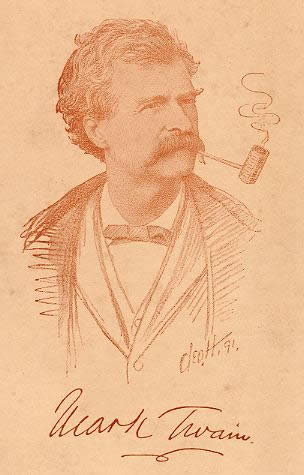
Mark Twain portrait from THE IDLER MAGAZINE February 1892
In a 1892 interview while crossing the Atlantic by boat, Twain shows his rapist wit with a young reporter...
Was Twain pulling a young interviewers leg, or did he in fact have bum's break in his pipe's?...
We may never know...
- Mark Twain, in his review in Alta California (March 3, 1868) of the play “The White Fawn”

Mark Twain, 1867
The Intoxicating Twain of Hasheesh
Mark Twain will forever be remembered for his beloved American classics such as 'The Adventures of Tom Sawyer', but what inspired such stories that would tug at the Worlds emotions?
In a 1865 article in the San Francisco Dramatic Chronicle, we get a hint into what inspired one of America's great writers...
Hasheesh...
"It appears that a ‘Hasheesh’ mania has broken out among our Bohemians. Yesterday, Mark Twain and the ‘Mouse-Trap’ man were seen walking up Clay street under the influence of the drug, followed by a ‘star,’ who was evidently laboring under a misapprehension as to what was the matter with them."
-The San Francisco Dramatic Chronicle, Sept. 18, 1865
150 years later and stoners still can't walk down the street without getting hassled by the man...

Pamphlet for which Samuel Clemens (Mark Twain) sought a copyright from the Library of Congress. c.1874
"Now, I don't approve of dissipation, and I don't indulge in it either; but I haven't a particle of confidence in a man who has no redeeming petty vices."
- Mark Twain, from the Moral Statisticia, 1893
By 1893 Twain had just about enough from the moral majority he encountered on a daily basis.
In a piece titled 'The Moral Statistician' Twain layed down a smack down leaving none to guess his stance.
The Moral Statistician, Originally published in Sketches, Old and New, 1893The Moral Statistician
Originally published in Sketches, Old and New, 1893
I don't want any of your statistics; I took your whole batch and lit my pipe with it.
I hate your kind of people. You are always ciphering out how much a man's health is injured, and how much his intellect is impaired, and how many pitiful dollars and cents he wastes in the course of ninety-two years' indulgence in the fatal practice of smoking; and in the equally fatal practice of drinking coffee; and in playing billiards occasionally; and in taking a glass of wine at dinner, etc. etc. And you are always figuring out how many women have been burned to death because of the dangerous fashion of wearing expansive hoops, etc. etc. You never see more than one side of the question.
You are blind to the fact that most old men in America smoke and drink coffee, although, according to your theory, they ought to have died young; and that hearty old Englishmen drink wine and survive it, and portly old Dutchmen both drink and smoke freely, and yet grow older and fatter all the time. And you never try to find out how much solid comfort, relaxation, and enjoyment a man derives from smoking in the course of a lifetime (which is worth ten times the money he would save by letting it alone), nor the appalling aggregate of happiness lost in a lifetime by your kind of people from not smoking. Of course you can save money by denying yourself all those little vicious enjoyments for fifty years; but then what can you do with it? What use can you put it to? Money can't save your infinitesimal soul. All the use that money can be put to is to purchase comfort and enjoyment in this life; therefore, as you are an enemy to comfort and enjoyment where is the use of accumulating cash?
It won't do for you to say that you can use it to better purpose in furnishing a good table, and in charities, and in supporting tract societies, because you know yourself that you people who have no petty vices are never known to give away a cent, and that you stint yourselves so in the matter of food that you are always feeble and hungry. And you never dare to laugh in the daytime for fear some poor wretch, seeing you in a good humor, will try to borrow a dollar of you; and in church you are always down on your knees, with your ears buried in the cushion, when the contribution-box comes around; and you never give the revenue officers a full statement of your income.
Now you know all these things yourself, don't you? Very well, then, what is the use of your stringing out your miserable lives to a lean and withered old age? What is the use of your saving money that is so utterly worthless to you? In a word, why don't you go off somewhere and die, and not be always trying to seduce people into becoming as ornery and unlovable as you are yourselves, by your villainous "moral statistics"?
Now, I don't approve of dissipation, and I don't indulge in it either; but I haven't a particle of confidence in a man who has no redeeming petty vices. And so I don't want to hear from you any more. I think you are the very same man who read me a long lecture last week about the degrading vice of smoking cigars, and then came back, in my absence, with your reprehensible fire-proof gloves on, and carried off my beautiful parlor stove.
- Mark Twain

Mark Twain portrait from THE IDLER MAGAZINE February 1892
In a 1892 interview while crossing the Atlantic by boat, Twain shows his rapist wit with a young reporter...
The solid repast of nicotine is taken by means of a corn-cob pipe. The bowl of this pipe is made from the hollowed-out cob of an ear of Indian corn. It is a very light pipe, and it colours brown as you use it, and ultimately black, so they call it in America "The Missouri Meerschaum." I was much impressed by the ingenuity with which Mark Twain fills his corn-cob pipe. The humorist is an inspired Idler. He is a lazy man, and likes to do things with the least trouble to himself. He smokes a granulated tobacco which he keeps in a long check bag made of silk and rubber. When he has finished smoking, he knocks the residue from the bowl of the pipe, takes out the stem, places it in his vest pocket, like a pencil or a stylographic pen, and throws the bowl into the bag containing the granulated tobacco. When he wishes to smoke again (this is usually five minutes later) he fishes out the bowl, which is now filled with tobacco, inserts the stern, and strikes a light. Noticing that his pipe was very-aged and black, and knowing that he was about to enter a country where corn-cob pipes are not, I asked him if he had brought a supply of pipes with him.
"Oh, no," he answered, "I never smoke a new corn-cob pipe. A new pipe irritates the throat. No corn-cob pipe is fit for anything until it has been used at least a fortnight."
"How do you manage then?" I asked. "Do you follow the example of the man with the tight boots;--wear them a couple of weeks before they can be put on?"
"No," said Mark Twain, "I always hire a cheap man--a man who doesn't amount to much, anyhow--who would be as well--or better--dead, and let him break in the pipe for me. I get him to smoke the pipe for a couple of weeks, then put in a new stem, and continue operations as long as the pipe holds together."
- Mark Twain interview from THE IDLER MAGAZINE, An Illustrated Monthly February 1892
Was Twain pulling a young interviewers leg, or did he in fact have bum's break in his pipe's?...
We may never know...
The Intoxicating Twain of Hasheesh continued...
"I cannot describe it. In my memory its courts & gardens will always be a hasheesh delusion, its Hall of Ambassadors a marvelous dream."
- Mark Twain, describing his morning visit to Alcazar, palace of the Moorish kings, in Seville after a late night party c.1867

Mark Twain photo at the Redding Library named after him
Years later, his friend Nikola Tesla would find that Twain had a softer side. While talking of younger days, Tesla tells Twain his writing had gotten him through a threatening illness when he was younger, thanking him...
Twain's response is priceless into character...
“I had hardly completed my course at the Real Gymnasium when I was prostrated with a dangerous illness or rather, a score of them, and my condition became so desperate that I was given up by physicians. During this period I was permitted to read constantly, obtaining books from the Public Library which had been neglected and entrusted to me for classification of the works and preparation of the catalogues. One day I was handed a few volumes of new literature unlike anything I had ever read before and so captivating as to make me utterly forget my hopeless state. They were the earlier works of Mark Twain and to them might have been due the miraculous recovery which followed. Twenty-five years later, when I met Mr. Clemens and we formed a friendship between us, I told him of the experience and was amazed to see that great man of laughter burst into tears.”
- Nikola Tesla on how Mark Twain “cured” him of an illness through his writing

Mark Twain participating in an experiment in Tesla's 5th Ave. lab as Tesla watches from behind. c.1894

Mark Twain's - The Adventures of Tom Sawyer Chapter 16
In a letter from 1891, Twain thinks about revisiting Huckleberry finn at the end of the story...
His idea for the ending would never be realized...
"Huck comes back 60 years old, from nobody knows where & crazy. Thinks he is a boy again, & scans always every face for Tom & Becky &c.
Tom comes, at last, 60 from wandering the world & tends Huck, & together they talk of old times; both are desolate, life has been a failure, all that was lovable, all that was beautiful is under the mould.
They die together."
- Mark Twain, in a 1891 letter on his Idea to end his Tom Sawyer and Huckleberry story.
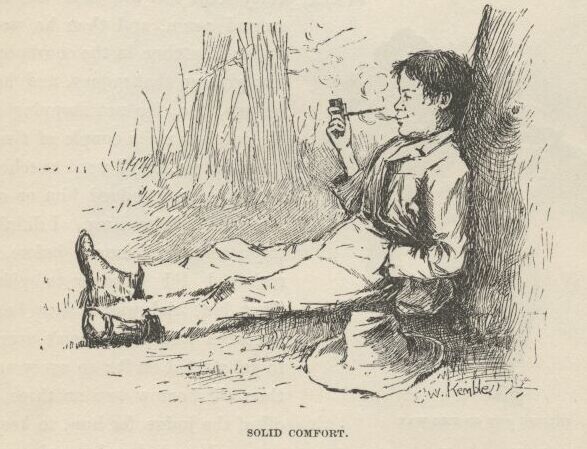
"I cannot describe it. In my memory its courts & gardens will always be a hasheesh delusion, its Hall of Ambassadors a marvelous dream."
- Mark Twain, describing his morning visit to Alcazar, palace of the Moorish kings, in Seville after a late night party c.1867

Mark Twain photo at the Redding Library named after him
Years later, his friend Nikola Tesla would find that Twain had a softer side. While talking of younger days, Tesla tells Twain his writing had gotten him through a threatening illness when he was younger, thanking him...
Twain's response is priceless into character...
“I had hardly completed my course at the Real Gymnasium when I was prostrated with a dangerous illness or rather, a score of them, and my condition became so desperate that I was given up by physicians. During this period I was permitted to read constantly, obtaining books from the Public Library which had been neglected and entrusted to me for classification of the works and preparation of the catalogues. One day I was handed a few volumes of new literature unlike anything I had ever read before and so captivating as to make me utterly forget my hopeless state. They were the earlier works of Mark Twain and to them might have been due the miraculous recovery which followed. Twenty-five years later, when I met Mr. Clemens and we formed a friendship between us, I told him of the experience and was amazed to see that great man of laughter burst into tears.”
- Nikola Tesla on how Mark Twain “cured” him of an illness through his writing

Mark Twain participating in an experiment in Tesla's 5th Ave. lab as Tesla watches from behind. c.1894

Mark Twain's - The Adventures of Tom Sawyer Chapter 16
In a letter from 1891, Twain thinks about revisiting Huckleberry finn at the end of the story...
His idea for the ending would never be realized...
"Huck comes back 60 years old, from nobody knows where & crazy. Thinks he is a boy again, & scans always every face for Tom & Becky &c.
Tom comes, at last, 60 from wandering the world & tends Huck, & together they talk of old times; both are desolate, life has been a failure, all that was lovable, all that was beautiful is under the mould.
They die together."
- Mark Twain, in a 1891 letter on his Idea to end his Tom Sawyer and Huckleberry story.











